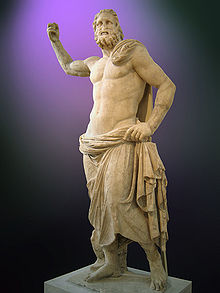Poseidon
| Poseidon | |
|---|---|
| God o the sea, yirdquauks, stuirms, an horse | |
 | |
| Abode | Sea |
| Symbol | Trident, Fish, Dowphin, Horse an Bull |
| Personal Information | |
| Consort | Amphitrite |
| Childer | Theseus, Triton, Polyphemus, Belus, Agenor, Neleus, Atlas |
| Parents | Cronus an Rhea |
| Siblins | Hades, Demeter, Hestia, Hera, Zeus |
| Roman equivalent | Neptune |
Poseidon or Posidon (Greek: Ποσειδῶν, gen: Ποσειδῶνος) is ane o the twal Olympian deities o the pantheon in Greek meethologie. His main domain is the ocean, an he is cried the "God o the Sea". Addeetionally, he is referred tae as "Yird-Shaker"[1] due tae his role in causin yirdquauks, an haes been cried the "tamer o horse".[2] He is uisually depictit as an aulder male wi curly hair an beard.
The name o the sea-god Nethuns in Etruscan wis adoptit in Laitin for Neptune in Roman meethologie; baith wur sea gods analogous tae Poseidon. Linear B tablets shaw that Poseidon wis veneratit at Pylos an Thebes in pre-Olympian Bronze Age Greece as a chief deity, but he wis integratit intae the Olympian gods as the brither o Zeus an Hades.[2] Accordin tae some fowklear, he wis savit bi his mither Rhea, who concealed him amang a flock o lamb an pretendit tae hae gien birth tae a cowt, whilk wis devoured bi Cronos.[3]
Thare is a Homeric hymn tae Poseidon, who wis the protector o mony Hellenic ceeties, awtho he lost the contest for Athens tae Athena. Accordin tae the references frae Plato in his dialogue Timaeus and Critias, the island o Atlantis wis the chosen domain o Poseidon.[4][5][6][7]
Notes
[eedit | eedit soorce]- ↑ Modern Greek media (e.g. "The Pacific: A history full of earthquakes" Ta Nea, 2011) and scholars (e.g. Koutouzis, Vassilis Archived 2012-11-10 at the Wayback Machine Volcanoes and Earthquakes in Troizinia) do not metaphorically refer to Poseidon but instead to Enceladus, the chief of the ancient Giants, to denote earthquakes in Greece.
- ↑ a b Burkert, Walter (1985). Greek Religion. Cambridge, MA: Harvard University Press. pp. 136–39. ISBN 0-674-36281-0.
- ↑ In the 2nd century AD, a well with the name of Arne, the "lamb's well", in the neighbourhood of Mantineia in Arcadia, where old traditions lingered, was shown to Pausanias. (Pausanias viii.8.2.)
- ↑ The story of Atlantis Archived 2013-07-10 at the Wayback Machine. Retrieved October 02, 2012.
- ↑ Plato (1971). Timaeus and Critias. Lunnon, Ingland: Penguin Books Ltd. pp. 167. ISBN 9780140442618.
- ↑ Timaeus 24e–25a, R. G. Bury translation (Loeb Classical Library).
- ↑ Also it has been interpreted that Plato or someone before him in the chain of the oral or written tradition of the report accidentally changed the very similar Greek words for "bigger than" ("meson") and "between" ("mezon") – Luce, J.V. (1969). The End of Atlantis – New Light on an Old Legend. London: Thames and Hudson. p. 224.
References
[eedit | eedit soorce]| Wikimedia Commons haes media relatit tae Poseidon. |
